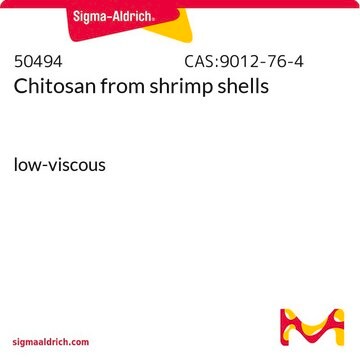C7170
Chitin from shrimp shells
practical grade, powder
Synonyme(s) :
Poly-(1→4)-β-N-acetyl-D-glucosamine
About This Item
Produits recommandés
Source biologique
shrimp (Pandalus borealis)
Qualité
practical grade
Forme
powder
Couleur
white to beige
Température de stockage
room temp
Chaîne SMILES
CC(=O)N[C@@H]1[C@H](O)O[C@@H](CO)[C@H](O)[C@H]1O
InChI
1S/C8H15NO6/c1-3(11)9-5-7(13)6(12)4(2-10)15-8(5)14/h4-8,10,12-14H,2H2,1H3,(H,9,11)/t4?,5?,6?,7?,8-/m1/s1
Clé InChI
OVRNDRQMDRJTHS-WTZNIHQSSA-N
Vous recherchez des produits similaires ? Visite Guide de comparaison des produits
Application
Qualité
Autres remarques
Code de la classe de stockage
11 - Combustible Solids
Classe de danger pour l'eau (WGK)
WGK 3
Point d'éclair (°F)
Not applicable
Point d'éclair (°C)
Not applicable
Équipement de protection individuelle
Eyeshields, Gloves, type N95 (US)
Certificats d'analyse (COA)
Recherchez un Certificats d'analyse (COA) en saisissant le numéro de lot du produit. Les numéros de lot figurent sur l'étiquette du produit après les mots "Lot" ou "Batch".
Déjà en possession de ce produit ?
Retrouvez la documentation relative aux produits que vous avez récemment achetés dans la Bibliothèque de documents.
Les clients ont également consulté
Notre équipe de scientifiques dispose d'une expérience dans tous les secteurs de la recherche, notamment en sciences de la vie, science des matériaux, synthèse chimique, chromatographie, analyse et dans de nombreux autres domaines..
Contacter notre Service technique






